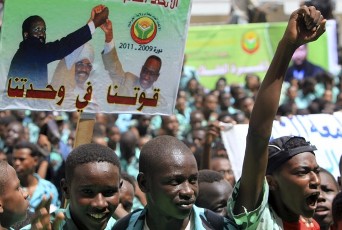Sudan’s North-South partners discuss economy, border security
By James Gatdet Dak
July 18, 2010 (JUBA) — A recently concluded North-South general conference involving adjacent or “intermingling” states has resolved to step up development projects in the South in order to boost the economy of the semi-autonomous region, as the clock ticks fast towards the referendum on independence due in less than six months.

A high level delegation from GoNU, which included federal ministers and five governors from northern states, led by the Vice President of Sudan, Ali Osman Mohamed Taha, and GoSS delegation, which also included ministers, governors and chiefs, led by the Vice President, Dr. Riek Machar Teny, converged in Aweil town where the two leaders co-chaired the gathering.
In the final communiqué produced after the two days deliberations, the two parties reaffirmed their commitment to maintain security and promote peaceful co-existence between the neighbouring states. It also reaffirmed the commitment to implement development projects in the South under the Unity Support Fund initiative.
The Unity Support Fund project was established in 2008 by the Presidency in Khartoum to implement a number of projects in trying to make unity attractive through development in the region. The First Vice President of the Republic and President of the Government of Southern Sudan, Salva Kiir Mayardit, heads the project initiative and he is deputized by the Vice President of Sudan, Ali Osman Mohamed Taha.
A number of projects were identified and signed recently in Juba for implementation prior to the conduct of the plebiscite in January 2011. The next similar conference is scheduled to take place in Abyei next October as a follow-up on the Aweil meeting, particularly in the area of security and implementation of the agreed projects.
The forum also affirmed the role undertaken by the media and the necessity of boosting it through availing them with the opportunity to get acquainted with the political, economic and security issues.
REFERENDUM TASKFORCE ON POST-REFERENDUM STRATEGIC PLANS
While the two parties have been preparing for the conduct of the referendum, post-referendum arrangements remain a challenge in either option of secession or unity.
The established Southern Sudan Referendum Taskforce met on Sunday, chaired by the Vice President, Dr. Riek Machar, and discussed strategic plans on the post-referendum issues before the negotiations could begin with the National Congress Party (NCP).
According to the minister of Information and spokesperson of the government, the meeting was an exposure of issues to be discussed by the lead negotiators and their respective working groups, particularly on such new issues of post-referendum arrangements which were not provided for in the CPA.
Officials say the post-referendum arrangements were not tackled in the 2005 North-South peace deal, the Comprehensive Peace Agreement (CPA), rendering them fresh negotiations by the two parties. With the exception of the future of the Joint Integrated Units (JIUs), which the CPA stipulates that in case of separation they will dissolve into their respective mother armies (SPLA and SAF), other burning issues such as the future of oil, its production, transport and export terminals, assets, liabilities, international agreements, citizenship and nationality, fate of southerners currently in the northern organized forces and vice versa, usage of Nile waters, currency, etc., were not addressed and resolved on in the CPA in order to only await implementation after possible separation.
The delay in the North-South border demarcation also remains a challenge, prompting Southern Sudan government officials to optionally express the region’s readiness to conduct the referendum even without the specifics of the border demarcations. This could also push it to the post-referendum issues negotiations.
The people of Southern Sudan shall, in the upcoming referendum, vote to choose between confirming the current unity of the Sudan under the CPA’s system of governance and opting to create their own independent country.
It is for the second time between North and South that the present NCP’s dominated regime under the current President, Omer Hassan Al-Bashir, signed an agreement on self-determination for the people of Southern Sudan through an internationally monitored referendum. Khartoum’s first commitment was in 1997 Khartoum Peace Agreement during which a referendum was to be conducted in four years by 2001.
The government at the time said that the referendum could not be conducted in the South while peace was not being consolidated with all the fighting forces in the region.
The Government of Southern Sudan is currently trying to maintain security and neutralize insecurity caused by some rebelled officers which could prevent the peaceful conduct of the long awaited referendum.
(ST)
